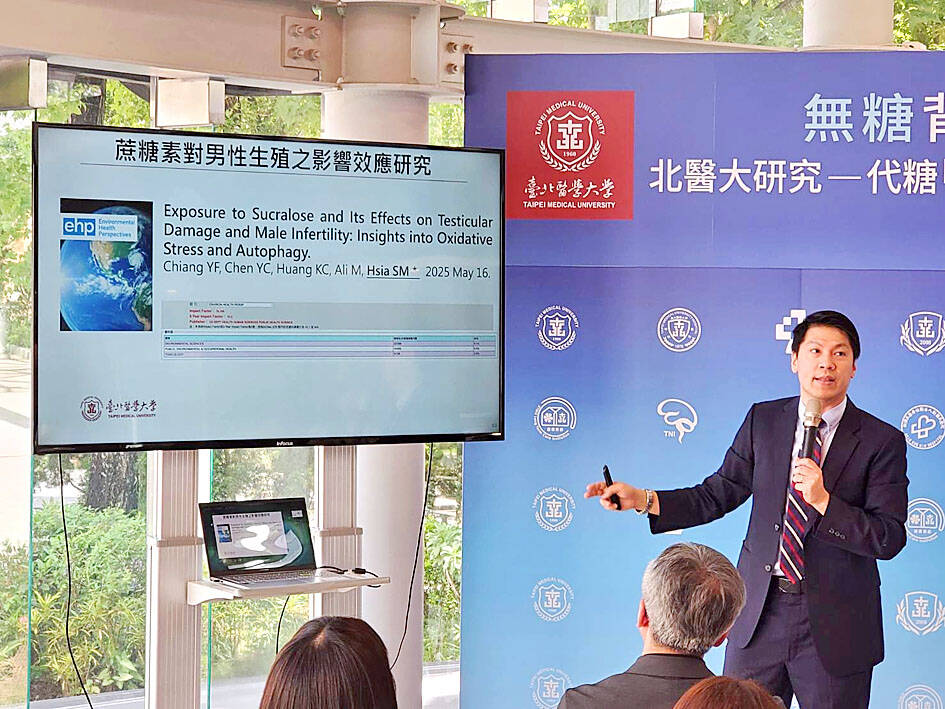The consumption of sugar substitute sucralose has been linked to male infertility, a study released by Taipei Medical University (TMU) said yesterday.
TMU School of Nutrition and Health Sciences head Hsia Shih-min (夏詩閔) told a news conference that the school’s research found that sucralose causes lowered performance to the T1R3 (taste receptor type 1 member 3) receptor protein in the testes.
The decreased performance of the protein then effects the secretion of hormones such as testosterone, which dampens the vitality of sperm cells and causes a deformity of the cells, Hsia said.

Photo: Lin Hui-chin, Taipei Times
After two months of feeding lab rats sucralose at levels acceptable to human beings, the testes of the rats sustained damage, while the rate of death observed in sperm cells increased by 25 percent, he said.
Lipid peroxidation is a process linked to abnormal release of hormones, and sucralose not only has the ability to increase lipid peroxidation, but can also suppress the growth of testes cells, Hsia said, adding that this was why he told the general public to be careful with their diet and be aware of their daily intake of the additive.
The average daily intake of sucralose for an adult Taiwanese should be 5 milligrams per kilogram, meaning a 60kg adult should consume no more than 300mg per day, he said.
Using carbonated sugar drinks as an example, Hsia said that an adult should drink no more than six bottles a day.
Natural foods such as fruit are a better choice than artificial sweeteners, he said.
Other than negatively affecting male fertility, sucralose could also cause female infertility or increase the possibility of premature birth, Hsia said.
Due to its adverse effects, the government should re-evaluate the substance’s risk and its regulatory policies, Hsia said.
The results of the TMU study were published last month in Environmental Health Perspectives, a peer-reviewed open access journal published monthly with support from the US National Institute of Environmental Health Sciences.

The Coast Guard Administration (CGA) yesterday said it had deployed patrol vessels to expel a China Coast Guard ship and a Chinese fishing boat near Pratas Island (Dongsha Island, 東沙群島) in the South China Sea. The China Coast Guard vessel was 28 nautical miles (52km) northeast of Pratas at 6:15am on Thursday, approaching the island’s restricted waters, which extend 24 nautical miles from its shoreline, the CGA’s Dongsha-Nansha Branch said in a statement. The Tainan, a 2,000-tonne cutter, was deployed by the CGA to shadow the Chinese ship, which left the area at 2:39pm on Friday, the statement said. At 6:31pm on Friday,

The Chinese People’s Liberation Army Navy’s (PLAN) third aircraft carrier, the Fujian, would pose a steep challenge to Taiwan’s ability to defend itself against a full-scale invasion, a defense expert said yesterday. Institute of National Defense and Security Research analyst Chieh Chung (揭仲) made the comment hours after the PLAN confirmed the carrier recently passed through the Taiwan Strait to conduct “scientific research tests and training missions” in the South China Sea. China has two carriers in operation — the Liaoning and the Shandong — with the Fujian undergoing sea trials. Although the PLAN needs time to train the Fujian’s air wing and

The American Institute in Taiwan (AIT) put Taiwan in danger, Ma Ying-jeou Foundation director Hsiao Hsu-tsen (蕭旭岑) said yesterday, hours after the de facto US embassy said that Beijing had misinterpreted World War II-era documents to isolate Taiwan. The AIT’s comments harmed the Republic of China’s (ROC) national interests and contradicted a part of the “six assurances” stipulating that the US would not change its official position on Taiwan’s sovereignty, Hsiao said. The “six assurances,” which were given by then-US president Ronald Reagan to Taiwan in 1982, say that Washington would not set a date for ending arm sales to Taiwan, consult

A Taiwanese academic yesterday said that Chinese Ambassador to Denmark Wang Xuefeng (王雪峰) disrespected Denmark and Japan when he earlier this year allegedly asked Japan’s embassy to make Taiwan’s representatives leave an event in Copenhagen. The Danish-language Berlingske on Sunday reported the incident in an article with the headline “The emperor’s birthday ended in drama in Copenhagen: More conflict may be on the way between Denmark and China.” It said that on Feb. 26, the Japanese embassy in Denmark held an event for Japanese Emperor Naruhito’s birthday, with about 200 guests in attendance, including representatives from Taiwan. After addressing the Japanese hosts, Wang